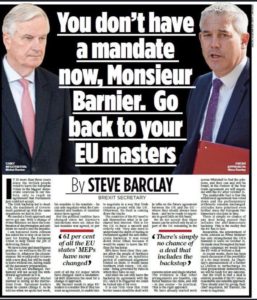In an article for the Mail On Sunday this weekend, Brexit Secretary Steve Barclay requested that the EU’s Chief Negotiator Michel Barnier “Go Back to [His] EU Masters” to request a new negotiating mandate as a first step toward releasing the political “deadlock” caused by the “Irish backstop” that has “gummed up” the “machinery of government” in the UK.
In politics, accuracy matters.
Whose backstop?
The article once referred to the “Irish backstop” and thereafter to the “undemocratic backstop.”
“The backstop” – shorthand for the Protocol on Ireland/Northern Ireland – is a 29-page section of the draft UK-EU Withdrawal Agreement (excluding annexes) and contains two kinds of provisions: those which would be applied in the whole of the UK (for example, Article 6) and those which would be applied in Northern Ireland alone (for example, Article 8 and 9).
One article involves Ireland – Article 5 – and enables the UK and Ireland to “continue to make arrangements between themselves” to uphold the Common Travel Area, and associated rights; an arrangement which pre-dates the EEC/EU membership.
If anything, this backstop is Northern Irish and British; but really, this is a collection of draft legal provisions mutually agreed between negotiating parties.
To suggest this backstop is “Irish” is, at best, unhelpful shorthand; at worst, deliberately deceptive.
Whose mandate?
The premise of the Mail On Sunday article was that although the “facts are unchanged,” there has been a “fundamental shift” in the “political realities” in the EU. To support this argument, reference was made to the results of the European Parliamentary elections: “[s]ince the last mandate was agreed, 61 per cent of all the EU states’ MEPs have changed.” This is true.
However, as had just been noted, the EU negotiating mandate came from the European Council, not the European Parliament. The European Council is made up of the leaders of the EU 27 Member States. In April 2017, the European Council agreed negotiating guidelines; these became the basis for the negotiating directives of the European Commission, agreed on 22 May 2017. While the substance of both texts echoed a European Parliament resolution on the negotiations passed on 5 April 2017, it would be misleading to suggest the negotiating mandate derived from, or is solely dependent on, the European Parliament.
To suggest that a substantive change in the political make-up of the European Parliament necessitates a substantive change in a mandate issued by the European Council is to conflate the actions and autonomy of two very distinct European institutions.
While the “political realities” have undoubtedly changed since the EU’s negotiating mandate was agreed, daily change is the very essence of the political.
Arguably, changing the political reality is precisely what this article was intended to do.
Who is “foisting” what?
A final point of a Northern Irish flavour. The article stated:
“MPs have been clear they cannot allow the people of Northern Ireland to have an indefinite period of continued alignment foisted on them. It would mean Northern Irish voters – UK citizens – being governed by rules in which they have no say.”
Reading the above, one might think that “the people of Northern Ireland” had rejected the backstop arrangement. Quite the opposite; they have not been asked.
Being without a government for over two and a half years, no official or representative set of Northern Irish voices have been heard on the question of the backstop.
That said, public polls have consistently found majority support in Northern Ireland for the kind of ‘soft Brexit’ arrangements that the backstop would provide. Further, Northern Ireland businesses, civil society, industry representatives, trade unions, civil servants and three of the five main political parties (excluding the DUP and UUP) have repeatedly spoken in favour of the UK-EU Withdrawal Agreement, including the backstop.
With respect to Northern Irish citizens having law “foisted on them,” the current provisions for making law on behalf of Northern Ireland at Westminster arguably enable just that.
While the backstop is not perfect, it reflects the ‘political realities’ of attempting to protect the multifaceted vulnerability of Northern Ireland as it faces Brexit. By contrast, a No-Deal Brexit of the kind this government is careering towards, simply could not and would not.
So, in short…
Northern Irish voters are becoming sadly used to “being governed by rules in which they have no say” and it’s not happening at the hands of the European Union.
It is not the European Parliament who gave Michel Barnier his mandate to negotiate, it was the democratically elected leaders of the 27 other EU Member States.
The backstop is not “Irish.”
We are in a moment of intense political drama and for Northern Ireland; the stakes could not be higher.
In politics, accuracy always matters, but even more so in times like these.

